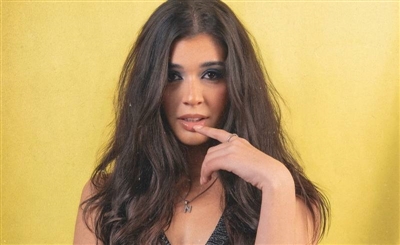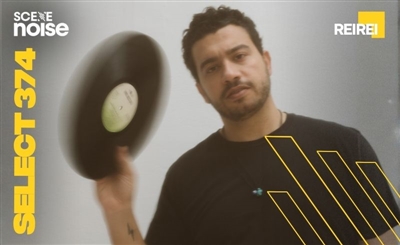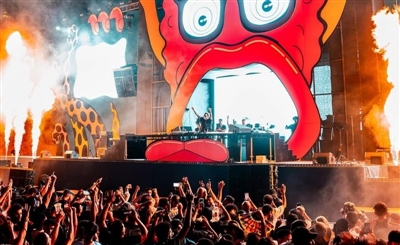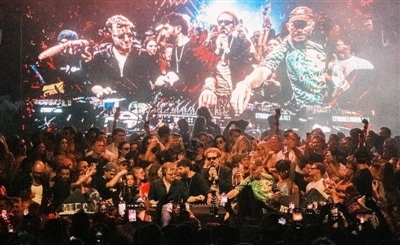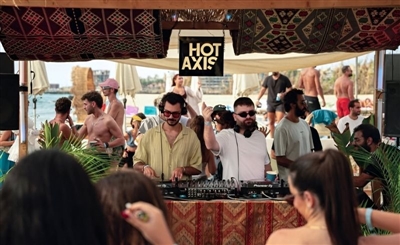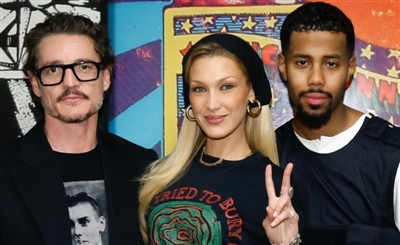Moroccan-Canadian Synth-Funk Duo De.Ville on Living in Lockdown, Self-Analysis & New EP ‘Atlantique’
Amidst lockdown and a struggling music scene in Montreal, De.Ville have come through with Atlantique, the soundtrack to a movie not yet made and their most concise piece of work yet.
.jpeg)
Photos by Lian Benoit
A few years ago, we spoke with Moroccan-Canadian duo De.Ville (comprised of Ziad Qoulaii and Simon Pierre) about the release of their 2018 debut Sables, which effortlessly fused funk, soul, jazz, trap, afro-beat, raï and tarab into a dizzying seven-track album that was easily one of the most engaging listens of the year. Since then, the duo has kept busy through a string of singles that culminated in the release of the euphoric synth-funk slow jam, ‘Dopamina’, this past October.
Now, De.Ville has returned with the release of a new three-track EP, Atlantique, which dropped today via Canadian label, Mandragore. While Sables was a sprawling exploration that frequently leaped between genres, Atlantique is more reserved, maintaining a unified sonic aesthetic across the three tracks through lush chords, saturated drums, and with a renewed focus on songwriting and infectious choruses over far-out instrumental experimentation.
<iframe width="560" height="315" src="https://www.youtube.com/embed/6610t7CahpY" frameborder="0" allow="accelerometer; autoplay; clipboard-write; encrypted-media; gyroscope; picture-in-picture" allowfullscreen></iframe>
We caught up with Qoulaii and Pierre for an inside take on Atlantique, their creative processes, and life as a musician in Montreal amongst the covid-19 pandemic.
<iframe style="border: 0; width: 400px; height: 241px;" src="https://bandcamp.com/EmbeddedPlayer/album=1121666461/size=large/bgcol=333333/linkcol=ffffff/artwork=small/transparent=true/" seamless><a href="https://devillemtl.bandcamp.com/album/atlantique">ATLANTIQUE by De.Ville</a></iframe>
How has 2020 been for De.Ville, and has this year offered any unique challenges for yourselves and your music?
Simon : 2020 is fucked up.
Ziad: We were used to being in the studio with friends, collaborators and people who inspire us. 2020 was different. We were supposed to go to a studio in Morocco for a month to work on music and invite artists, just when the pandemic hit.
Simon: The main challenge was to find inspiration in a world where nothing is happening around us, without our friends, fans, shows, traveling, living life. It was more introspective. Personally, I had a lot of time to think about why I am doing this, what do we want to say through our music and what the purpose of an artist is right now.
Your 2019 Album, Sables, definitely comes across as darker and more introspective than Atlantique. It’s clear you're channeling a lot of different inspirations into this new EP; we hear glimpses of upbeat synth-funk, soul, jazz, trip-hop, trap, and downtempo across the three tracks. Could you tell us a bit about this sonic shift in direction?
Simon: I like your analysis! I did not see it like that and I wish I had a clear answer for you. There are songs that are the results of experimentations. Sometimes I will listen to a certain artist, or genre from a specific year, and get really obsessed for a few days. It will sometimes leave a trace in our music.
It is a blessing to be working with an artist like Ziad because he has this open-mindedness that gives us total freedom when we are in the studio. We are never stuck in any clichés of genres. We never really know where it will go and we try not to plan it too much. I like how Atlantique happened for example: Ziad came in the studio early and I was playing around with chords. He liked them and recorded a melody over the chords alone. Then we muted the vocals, forgot about them and created the demo version of the instrumental. Later we remembered that we had vocals and expected them not to work anymore, but we instantly fell in love with [how they worked together].
Ziad: I would probably have recorded something totally different if I had heard the whole instrumental instead of the simple ‘naked’ chords. I later wrote the lyrics trying to keep the original melody. We kept imagining waves while listening to it and there was a strong sense of nostalgia, fear and hope in the sound [design]. This is how Atlantique, both the song and the EP, was born.
Continuing the comparison between the two, Sables feels like an exploration of multiple genres, and indeed covers a lot of ground across its seven tracks, while Atlantique seems more concise and focused. Was this a deliberate effort?
Simon: Well, to be honest I was a little bit afraid the three songs were too different to live together at first, so thank you for saying it is concise and focused! We keep exploring different genres, but I think we have more and more understanding and control over our sound and our sonic universe.
I would answer that there are two things that could explain the unity of the project despite its multiple [genres]; the storytelling and the mixing process. The three songs are actually one story and it kind of follows a familiar emotional and narrative flow which might help giving it a feeling of unity. During the mixing process, we really wanted to make the songs belong together and used some common elements to create a universe unique to this EP. Shout out to Nico Gigou, our mix engineer and good friend. Damn, your questions make us analyse our stuff which we never really do…
Ziad: Atlantique was initially a movie score, and the EP was supposed to be the soundtrack of a movie. There is a whole scenario that exists. Inshallah someday it will be made into a whole movie.
Do you feel like your approach to lyrics/songwriting has changed at all over the course of this new project?
Ziad: By listening to music of all kinds and especially pentatonic voices, I have developed a mental sound bank. Every time I hear a composition by Simon, I will instinctively look for the singing technique and the melody appropriate to the universe of the song, which is inspired by my listening experience, and by [testing out different ideas] we end up perfecting the singing. So I think this technique is slowly evolving alongside our sound. I consider De.Ville to be like a sound and sensory laboratory
Atlantique see’s De.Ville introducing a lot of falsetto vocals into play amongst your tracks, especially in the sweeping choruses. What was the process of integrating this into your tracks?
Simon: I have no idea. Thinking about it I think we actually have a lot of R&B influences in what we worked on since Sables, so that is probably where it comes from. I think I hear it in many other yet unreleased songs we have in the bank actually.
Ziad: Japanese music, too.
What is the situation like in Montreal’s music scene amidst corona? Are you still able to perform your music live? If not, how has this affected De.Ville?
Ziad: Honestly, it is really bad. But at the same time we are super lucky to be here right now. The cultural scene is dead, but we have government support [in ways] that other places don’t. We did a few virtual shows, but we grew tired of it and decided to focus on studio work this year. We have some very cool virtual gigs coming up in 2021, though.
Simon: Yes, and we are lucky because we were not planning a summer on the road anyway. We of course got a bunch of gigs canceled like everybody else, but we already planned to [spend more time] in the studio in 2020 and more on stage in 2021. Inshallah 2021 will be better. Honestly, respect to all the artists that released amazing work during the pandemic. Beautiful music came out and it sucks not to be able to defend it on stage.
Do you have any goals or intentions for Atlantique and its upcoming release?
Ziad : Our manager would have a totally different answer, but with this release we really just want to touch people, send a message of solidarity and love to all the migrants and open some eyes to this issue. It is also a beautiful opportunity to release our first music video.
Where does Atlantique fit in amongst your discography?
Simon: [It exists] in a parallel universe to Sables. We have a bunch of music that will come out and be the continuity of what we did before, but this release is special and for us it is not commercially oriented. It is also a project we did in collaboration with the crazy talented cinematographer Alexandre Nour Desjardins and his team at Telescope here in Montreal. We see him as part of De.Ville as much as us and our musicians.
Ziad: We’ve worked with him for maybe two years now, wrote a bunch of script ideas and all that work led to this opportunity to present our visual universe for the first time. We are blessed with these talented people that gravitate around the project and are willing to help us tell our story.
Are there any future plans for De.Ville that you can share with us?
Simon: We are still figuring out what is happening with the music industry and all that. We need to figure out how we will present our music to the world in 2021. But definitely we have a lot coming up and a lot to say. Hopefully the borders will all open!
Follow De.Ville on Facebook and Instagram
- Previous Article test list 1 noise 2024-03-13
- Next Article Joranian-Palestinian Rapper The Synaptik Signs with Warner Music



